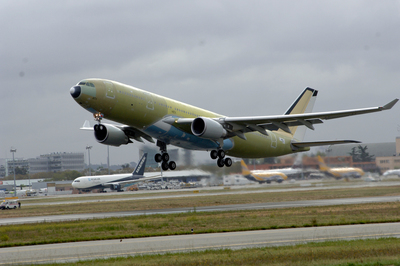T he wait is over. The team of Northrop Grumman/EADS has triumphed over Boeing in the Air Force’s KC-X tanker contest, senior USAF officials announced late Friday, ending an intensive competition and filling USAF’s top procurement priority. The transatlantic consortium won a $1.5 billion contract for the system development and demonstration phase of the KC-X program that will yield up to 179 new tanker aircraft, recently designated KC-45As, under work estimated to be worth about $35 billion over the next 15 years or so. The new tanker model is Northrop Grumman’s KC-30 design, which features the Airbus A330 airframe. It will replace USAF’s oldest Eisenhower-era KC-135s. The SDD phase includes the manufacture of four test aircraft. The new contract also includes five production options, together worth $10.6 billion, for 64 airplanes, the Air Force said Feb. 29. Boeing bid the KC-767. “Today’s announcement is the culmination of years of tireless work and attention to detail by our acquisition professionals and source selection team, who have been committed to maintaining integrity, providing transparency, and promoting a fair competition for this critical aircraft program,” Air Force Secretary Michael Wynne said a USAF statement. The Air Force said it could not provide additional information on the proposals and the Northrop Grumman contract at this time until both industry teams have had the chance to be debriefed. Boeing spokesman Bill Barksdale said in a statement: “Obviously we are very disappointed with this outcome. We believe that we offered the Air Force the best value and lowest risk tanker for its mission.” He said the company is awaiting the debrief. There has been speculation that a protest by the loser is inevitable since the stakes in the KC-X program were so high: The winner may eventually have the inside track on building hundreds of more tankers to replace some 500 KC-135s in the fleet. “Once we have reviewed the details behind the award, we will make a decision concerning our possible options, keeping in mind at all times the impact to the warfighter and our nation,” Barksdale said.
he wait is over. The team of Northrop Grumman/EADS has triumphed over Boeing in the Air Force’s KC-X tanker contest, senior USAF officials announced late Friday, ending an intensive competition and filling USAF’s top procurement priority. The transatlantic consortium won a $1.5 billion contract for the system development and demonstration phase of the KC-X program that will yield up to 179 new tanker aircraft, recently designated KC-45As, under work estimated to be worth about $35 billion over the next 15 years or so. The new tanker model is Northrop Grumman’s KC-30 design, which features the Airbus A330 airframe. It will replace USAF’s oldest Eisenhower-era KC-135s. The SDD phase includes the manufacture of four test aircraft. The new contract also includes five production options, together worth $10.6 billion, for 64 airplanes, the Air Force said Feb. 29. Boeing bid the KC-767. “Today’s announcement is the culmination of years of tireless work and attention to detail by our acquisition professionals and source selection team, who have been committed to maintaining integrity, providing transparency, and promoting a fair competition for this critical aircraft program,” Air Force Secretary Michael Wynne said a USAF statement. The Air Force said it could not provide additional information on the proposals and the Northrop Grumman contract at this time until both industry teams have had the chance to be debriefed. Boeing spokesman Bill Barksdale said in a statement: “Obviously we are very disappointed with this outcome. We believe that we offered the Air Force the best value and lowest risk tanker for its mission.” He said the company is awaiting the debrief. There has been speculation that a protest by the loser is inevitable since the stakes in the KC-X program were so high: The winner may eventually have the inside track on building hundreds of more tankers to replace some 500 KC-135s in the fleet. “Once we have reviewed the details behind the award, we will make a decision concerning our possible options, keeping in mind at all times the impact to the warfighter and our nation,” Barksdale said.
House, Senate Unveil Competing Proposals for 2026 Budget
July 11, 2025
Lawmakers from the House and Senate laid out competing versions of the annual defense policy bill on July 11, with vastly different potential outcomes for some of the Air Force’s most embattled programs.